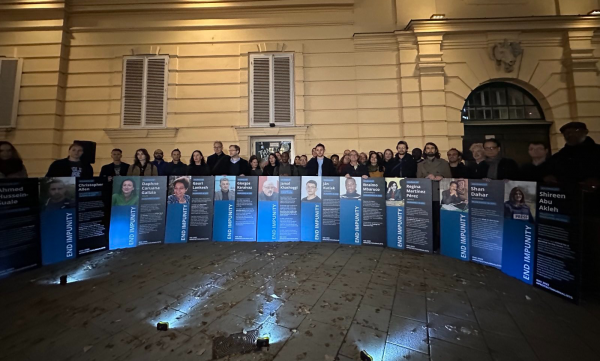ARTICLE 19, Committee to Protect Journalists (CPJ), the International Press Institute and Reporters Without Borders are deeply concerned that Ukrainian journalist Anhar Kochneva, kidnapped by Syrian rebels in October 2012, is in grave danger of being murdered. Her kidnappers, allegedly members of the Free Syrian Army, have threatened to kill her tomorrow, 13 December 2012, if their demand for USD 50 million is not paid.
The four organizations urge the leadership of the Free Syrian Army and of the National Coalition for Syrian Revolutionary and Opposition Forces to ensure that Anhar Kochneva is not harmed and is released without any further delay, in compliance with international Humanitarian law that protects journalists working in situations of conflict, like in Syria.
We also call on the French, British and US governments, as well as the European Union, to fully engage the National Coalition for Syrian Revolutionary and Opposition Forces in compelling Free Syrian Army to facilitate Kochneva’s release. These three countries, along with the European Union, have recognized the Coalition and its leader Ahmed Mouaz al-Khatib as the legitimate representatives of the Syrian people and as such bear responsibility in stressing to the Coalition the importance of respecting human rights and international human rights norms and condemning violations.
Anhar Kochneva was kidnapped at the beginning of October 2012 near the city of Homs. Kochneva had been reporting from Syria for a number of prominent Russian media outlets and helping Russian journalists working in the region. Kochneva was known for strongly criticizing the Syrian opposition, which she had publicly accused of cruelty to civilians and prisoners of war
On 7 November, a month after her kidnapping, a video message from Kochneva was published on the Internet in which she appealed to the Embassies of Ukraine and Russia, as well as the Syrian government, to meet the demands of the kidnappers. On 28 November, a second video of the kidnapped journalist was published online in which she read a text in Arabic admitting to having participated in the battles, working as a military interpreter with Syrian and Russian officers. We are deeply concerned that in both video appeals the journalist seems to be speaking under pressure.
Under International humanitarian law, journalists are considered as civilians. Journalists do not lose this status by entering a battleground for professional purposes. Like other civilians, journalists cannot be the object of attacks, torture, or inhuman or degrading treatment. If arrested, they should be treated humanely, or charged, or released.
According to Reporters without Borders, since the beginning of the Syrian conflict, 17 journalists and 48 citizen-journalists have been killed; 21 journalists and 18 citizen-journalists are currently imprisoned by the Syrian government. Committee to Protect Journalists (CPJ) considered Syria the deadliest country for Journalists in 2012, with 24 journalists killed since the conflict began in March 2011.
ARTICLE 19
Committee to Protect Journalist (CPJ)
International Press Institute
Reporters Without Borders


